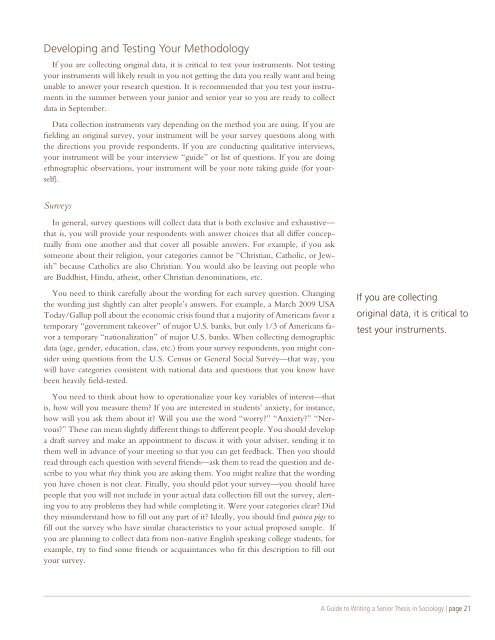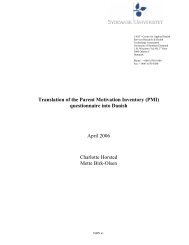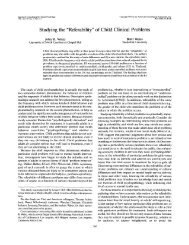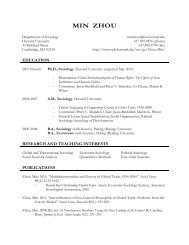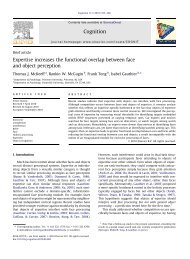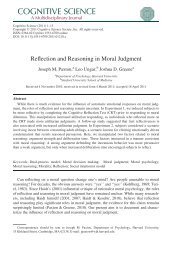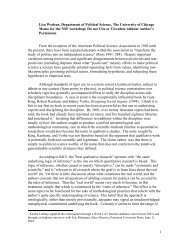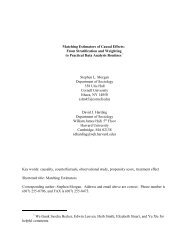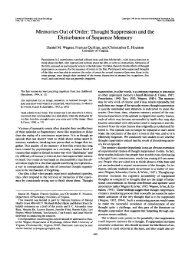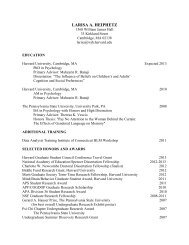A Guide to Writing a Senior Thesis in Sociology - WJH Home Page ...
A Guide to Writing a Senior Thesis in Sociology - WJH Home Page ...
A Guide to Writing a Senior Thesis in Sociology - WJH Home Page ...
You also want an ePaper? Increase the reach of your titles
YUMPU automatically turns print PDFs into web optimized ePapers that Google loves.
Develop<strong>in</strong>g and Test<strong>in</strong>g Your Methodology<br />
If you are collect<strong>in</strong>g orig<strong>in</strong>al data, it is critical <strong>to</strong> test your <strong>in</strong>struments. Not test<strong>in</strong>g<br />
your <strong>in</strong>struments will likely result <strong>in</strong> you not gett<strong>in</strong>g the data you really want and be<strong>in</strong>g<br />
unable <strong>to</strong> answer your research question. It is recommended that you test your <strong>in</strong>struments<br />
<strong>in</strong> the summer between your junior and senior year so you are ready <strong>to</strong> collect<br />
data <strong>in</strong> September.<br />
Data collection <strong>in</strong>struments vary depend<strong>in</strong>g on the method you are us<strong>in</strong>g. If you are<br />
field<strong>in</strong>g an orig<strong>in</strong>al survey, your <strong>in</strong>strument will be your survey questions along with<br />
the directions you provide respondents. If you are conduct<strong>in</strong>g qualitative <strong>in</strong>terviews,<br />
your <strong>in</strong>strument will be your <strong>in</strong>terview “guide” or list of questions. If you are do<strong>in</strong>g<br />
ethnographic observations, your <strong>in</strong>strument will be your note tak<strong>in</strong>g guide (for yourself).<br />
Surveys<br />
In general, survey questions will collect data that is both exclusive and exhaustive—<br />
that is, you will provide your respondents with answer choices that all differ conceptually<br />
from one another and that cover all possible answers. For example, if you ask<br />
someone about their religion, your categories cannot be “Christian, Catholic, or Jewish”<br />
because Catholics are also Christian. You would also be leav<strong>in</strong>g out people who<br />
are Buddhist, H<strong>in</strong>du, atheist, other Christian denom<strong>in</strong>ations, etc.<br />
You need <strong>to</strong> th<strong>in</strong>k carefully about the word<strong>in</strong>g for each survey question. Chang<strong>in</strong>g<br />
the word<strong>in</strong>g just slightly can alter people’s answers. For example, a March 2009 USA<br />
Today/Gallup poll about the economic crisis found that a majority of Americans favor a<br />
temporary “government takeover” of major U.S. banks, but only 1/3 of Americans favor<br />
a temporary “nationalization” of major U.S. banks. When collect<strong>in</strong>g demographic<br />
data (age, gender, education, class, etc.) from your survey respondents, you might consider<br />
us<strong>in</strong>g questions from the U.S. Census or General Social Survey—that way, you<br />
will have categories consistent with national data and questions that you know have<br />
been heavily field-tested.<br />
You need <strong>to</strong> th<strong>in</strong>k about how <strong>to</strong> operationalize your key variables of <strong>in</strong>terest—that<br />
is, how will you measure them? If you are <strong>in</strong>terested <strong>in</strong> students’ anxiety, for <strong>in</strong>stance,<br />
how will you ask them about it? Will you use the word “worry?” “Anxiety?” “Nervous?”<br />
These can mean slightly different th<strong>in</strong>gs <strong>to</strong> different people. You should develop<br />
a draft survey and make an appo<strong>in</strong>tment <strong>to</strong> discuss it with your adviser, send<strong>in</strong>g it <strong>to</strong><br />
them well <strong>in</strong> advance of your meet<strong>in</strong>g so that you can get feedback. Then you should<br />
read through each question with several friends—ask them <strong>to</strong> read the question and describe<br />
<strong>to</strong> you what they th<strong>in</strong>k you are ask<strong>in</strong>g them. You might realize that the word<strong>in</strong>g<br />
you have chosen is not clear. F<strong>in</strong>ally, you should pilot your survey—you should have<br />
people that you will not <strong>in</strong>clude <strong>in</strong> your actual data collection fill out the survey, alert<strong>in</strong>g<br />
you <strong>to</strong> any problems they had while complet<strong>in</strong>g it. Were your categories clear? Did<br />
they misunderstand how <strong>to</strong> fill out any part of it? Ideally, you should f<strong>in</strong>d gu<strong>in</strong>ea pigs <strong>to</strong><br />
fill out the survey who have similar characteristics <strong>to</strong> your actual proposed sample. If<br />
you are plann<strong>in</strong>g <strong>to</strong> collect data from non-native English speak<strong>in</strong>g college students, for<br />
example, try <strong>to</strong> f<strong>in</strong>d some friends or acqua<strong>in</strong>tances who fit this description <strong>to</strong> fill out<br />
your survey.<br />
If you are collect<strong>in</strong>g<br />
orig<strong>in</strong>al data, it is critical <strong>to</strong><br />
test your <strong>in</strong>struments.<br />
A <strong>Guide</strong> <strong>to</strong> <strong>Writ<strong>in</strong>g</strong> a <strong>Senior</strong> <strong>Thesis</strong> <strong>in</strong> <strong>Sociology</strong> | page 21


